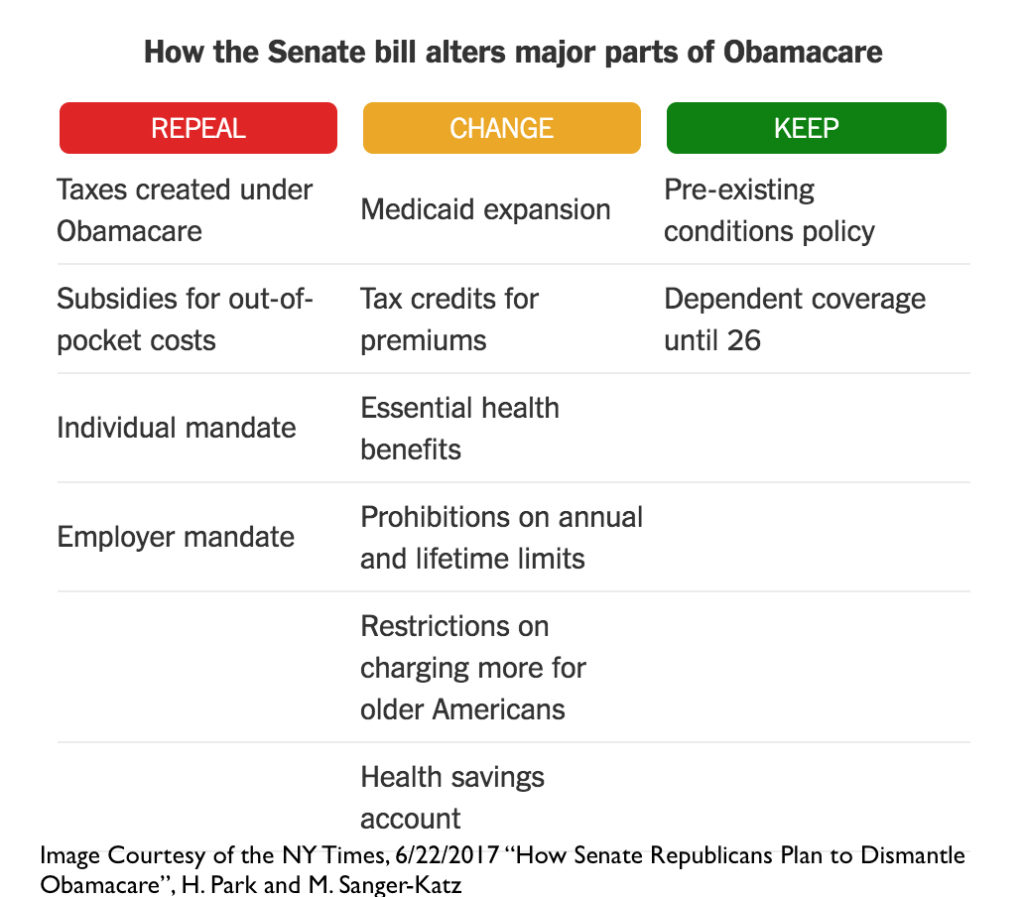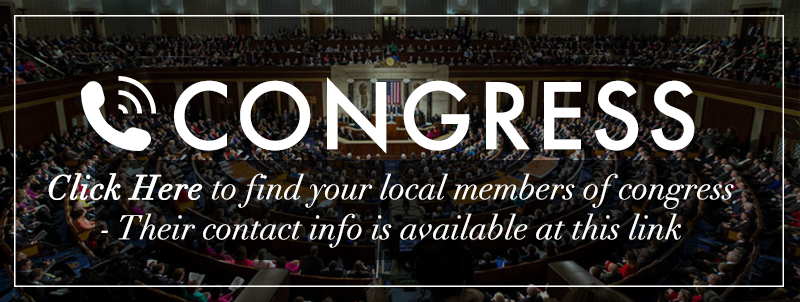Advocating for Health: The Better Care Reconciliation Act of 2017
Our country has long distinguished itself as a beacon of hope, a bastion of compassion, and a place where individuals are free to strive for fulfilling their greatest potential. An integral part to fulfilling one’s potential is equitable access to healthcare and the advantages afforded by good health, physically, mentally, and spiritually.
The bill put forth today by the Senate will result in millions of Americans losing access to quality, affordable health insurance. While The Better Care Reconciliation Act of 2017 would cut off expanded Medicaid funding for states more gradually than the House bill it would enact deeper long-term cuts to the health-care program for low-income Americans. The net result will inevitably be throwing tens of millions of American’s off the health care rolls, rather than ensuring that all Americans have reasonable access to healthcare.

This NY Times graphic gives a breakdown of the major elements of the Better Care Reconciliation Act of 2017.
We should never be predestined to die at a certain age because of our race, color, zipcode or health insurance status.
Health is a human right. Dignity is a human right. They go hand in hand.
Action is needed to ensure that we keep the health of all Americans first and foremost in mind, remembering that if we eschew the dignity of the populace and ignore the needs of society’s must vulnerable, we compromise those very principles that made us this great nation.
Here are UMMA’s main takeaways for the Better Care Reconciliation Act of 2017:
- Rolls back a number of tax provisions and much of the Affordable Care Act (ACA)
- Scales back funding that goes toward health coverage for low-income Americans
- Scales back tax credits for middle-income earners who purchase their own health insurance
- Cuts off access to funding for abortion providers through redistributing program funds.
- Stabilizes ACA insurance markets in the near term through reallocated funding.
- For older Americans – provides more generous tax credits for health coverage (than the House of Representative’s tax bill).
- For middle-income Americans – reduces the amount of people who qualify for financial support for health coverage, and reduces the amount of support provided for those who qualify.
- For low-income Americans – creates deeper long-term cuts to the healthcare program and gradually cuts off funding for Medicaid expansion
- May reduce premium increases for next year’s individual insurance market by reassuring insurers who were uncertain how to move forward with the 2018 plan.
- Gives Senate and the House the ability to redefine what qualifies as essential elements of a healthcare plan. (The ACA had required health plans to cover essential benefits such as maternity, hospital care, prescription drugs and mental health)
How does the Senate’s proposed Act compare to what Congress presented?:
Tax Credits
- While Congress proposed tax credits based on age, the Senate would like for them to be based on income level (as they currently are with the ACA), although the credits would have a lower percentage cap of overall medical costs.
Medicaid
-
Expansion
- The Congress Act creates caps and cuts for older Americans, people with disabilities and families with children.
- The Senate’s Act will phase out the ACA’s Medicaid expansion, which had made the program available to Americans making up to 138% of the Federal Poverty Limit (from 100%, to accommodate for the working poor)
- In 2020, 90% of the current allotted federal funding would be provided, but would then decrease by 5% each year until 2023.
- Medicaid expansion would be eliminated starting in 2024.
-
Spending growth
- The Congress Act creates a per-capita cap for federal Medicare spending
- Senate also has a per capita cap, however, after 2025, there will be a shift in growth when it transitions from the Consumer Price Index (CPI) for medical care, to the CPI for ALL goods
-
Work requirements
- By Senate’s Act, states would determine who may receive Medicaid based on whether they have maintained employment (as they choose to define it) for a period of time (that would be determined on a state-by-state basis)
Essential health benefits
- Both Senate and Congress’ Acts allow states to opt out of the ACA’s essential health benefits that must be included in each health plan – the “10 basic types of care” to create “skinny” health plans.
- Congress’ Act removes the ACA’s consumer protections by allowing the state to determine whether insurance plans can exclude key services and by charging people with pre-existing conditions unaffordable premiums.
- The Senate’s Act would not let states repeal the provision where people of the same age in the same area should be charged the same amount (Community Rating)
Individual insurance mandate
- Congress’ Act removes the ACA’s rule of all American’s having to have active health insurance or pay a penalty, but allows insurers to tack on a 30% surcharge on Americans who let their coverage lapse and wish to sign back on again.
- Senate’s bill fully reverses the ACA by allowing Americans to not have health coverage without a penalty.
Employer mandate
- Both Congress and the Senate remove the ACA provision of requiring larger employers to provide affordable health coverage to their employees.
Opioid Crisis & Mental Health
- Senate’s Act creates a $2 billion federal fund for states to draw from for substance use disorder treatment and recovery support services for constituents with mental or substance abuse disorders.
Planned Parenthood
- Funding for Planned Parenthood would immediately be cut off for at least one year by both Congress and the Senate’s Acts.
Stay on parent’s insurance until Age 26
- Senate and Congress’ Acts both allow this provision to remain.
Now that you’ve read the synopsis, take action!
- Share this information with friends, family, coworkers, colleagues, neighbors. No one should be left in the dark.
- Call your representatives and let them know why you do not support this act
We are committed to advocating for healthcare and civil rights and will continue to give a voice to the voiceless. Change begins with raising awareness – helping those who may not be aware or feel that it does not impact them to understand the consequences of legislature such as this and have a shift in perception. As supporters of health for all and dignity for all, with persistence, together we can have an impact.
UMMA Clinic provides high-quality, comprehensive physical and behavioral health services to the residents of South Los Angeles, regardless of their ability to pay. We sincerely appreciate your support: http://ummaclinic.kindful.com



